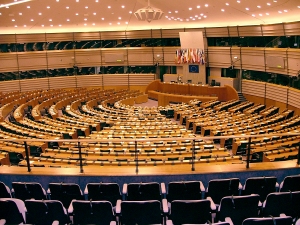27 October
2011
Common Cause on the European Union’s Flaws
Posted in British Politics, Europe, Political Economy, World Affairs
The parliamentary debate which occurred on Monday, upon a non-binding motion proposing that a referendum on the UK’s membership of the EU be held, has been widely portrayed as a debate internal to the Conservative party, with its leadership and frontbench squaring up to those on the backbenches. More specifically, the issue has been portrayed as a battle between the Tory Right and Mr. Cameron’s more liberal government. An article in The Guardian was headlined, ‘Cameron’s Little Englanders need some German Lessons’.
It has not been adequately noticed, however, that one of those who spoke in favour of the motion on Monday was the MP for Brighton Pavilion, Caroline Lucas. She is leader of the Green Party, a body not noted for advocating ‘right-wing’ policies or for its Euroscepticism-rather, quite the reverse in both fields.
In the debate Ms. Lucas declared:
In my experience, many of today’s European citizens are simply no longer sure what the EU is for. In my view, the ambitious free trade project at the heart of its original treaties has become an end in itself. Debates about the future of the EU have been dominated by the idea that the overriding goals of European integration are economic and that the progress of the EU should be judged in terms of economic growth and the removal of market barriers alone. As a result, the EU has failed to address fundamental questions of political culture and strategic purpose and has therefore also failed to inspire the mass of citizens with a sense of enthusiasm and common cause, thus calling into question its own legitimacy.
In order to tackle the new threats and challenges we face today and to deliver a fair, sustainable and peaceful Europe into the 21st century and beyond, the EU must undergo radical reform. It must become more democratic and accountable, less bureaucratic and remote. It also needs to have a more compelling vision of its role and purpose, and a referendum would provide an opportunity to debate precisely those issues. To try to shut down that opportunity is, I think, very dangerous. It is possible to be pro a reformed EU and in favour of a referendum.
Ms. Lucas went on to criticise the European Constitution/Lisbon Treaty saga as ‘extraordinary arrogance’. Ms. Lucas’s speech is interesting on account of the attention it gave to the flaws and problems of the current EU rather than for anything she had to say about remedies and solutions. She highlighted the democratic deficit.
Every five years there takes place the usual electoral rigmaroles of candidate selection, campaigns and late-night vote-counting for the European Parliament. Members are elected and groups formed within the Parliament of like-minded parties from the different nations. It might be expected by the naive that the largest grouping would form an administration, and the second largest an opposition, with smaller groups also in opposition. Individual members might then, in our dreams, also be able to use their mandate to introduce legislative proposals, with the majority administration mounting a serious programme. None of this in fact happens.
The largest grouping has only the privilege of nominating one of its own to act as President of the Commission. The ‘Ministers’ or Commissioners are nominated by the member states and do not have to accord politically with the largest grouping in the Parliament. This ‘government’ must act in accord with ‘European Interests’, something which is incredibly vague and has little to do with what the voters were presented with at the ballot box.
For a democracy to be properly democratic the leading figures in the executive must be accountable, directly and indirectly, to the electors. This accountability results in individuals’ performance in office being open to judgement over the decisions made and laws passed. Those who are elected must be endowed with a capacity for legislative initiative. Currently that is the prerogative solely of the unelected Commission, thereby rendering any meaningful manifesto commitment given by an individual running for election to the European Parliament as unachievable. The elected individual can only pass judgement upon, and amend, such legislation as is placed in front of him or her.
Arguments about the conflict between an individual nation’s sovereignty and the power and role of a body such as the EU, whilst of great importance, are not relevant to this particular issue. Nor are the relative advantages and disadvantages of democracy as contrasted with other forms of governance. The issue is that the cloak of a democracy which the EU vaunts, and advocates globally, is empty, for it is not practised within its own system of governance. That is the notable point made by the avidly pro-European Ms. Lucas.

Leave a Reply